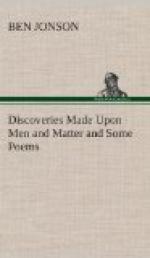Falsae species fugiendae.—I am glad when I see any man avoid the infamy of a vice; but to shun the vice itself were better. Till he do that he is but like the ’pientice, who, being loth to be spied by his master coming forth of Black Lucy’s, went in again; to whom his master cried, “The more thou runnest that way to hide thyself, the more thou art in the place.” So are those that keep a tavern all day, that they may not be seen at night. I have known lawyers, divines—yea, great ones—of this heresy.
Decipimur specie.—There is a greater reverence had of things remote or strange to us than of much better if they be nearer and fall under our sense. Men, and almost all sorts of creatures, have their reputation by distance. Rivers, the farther they run, and more from their spring, the broader they are, and greater. And where our original is known, we are less the confident; among strangers we trust fortune. Yet a man may live as renowned at home, in his own country, or a private village, as in the whole world. For it is virtue that gives glory; that will endenizen a man everywhere. It is only that can naturalise him. A native, if he be vicious, deserves to be a stranger, and cast out of the commonwealth as an alien.
Dejectio Aulic.—A dejected countenance and mean clothes beget often a contempt, but it is with the shallowest creatures; courtiers commonly: look up even with them in a new suit, you get above them straight. Nothing is more short-lived than pride; it is but while their clothes last: stay but while these are worn out, you cannot wish the thing more wretched or dejected.
Poesis, et pictura.—Plutarch. Poetry and picture are arts of a like nature, and both are busy about imitation. It was excellently said of Plutarch, poetry was a speaking picture, and picture a mute poesy. For they both invent, feign and devise many things, and accommodate all they invent to the use and service of Nature. Yet of the two, the pen is more noble than the pencil; for that can speak to the understanding, the other but to the sense. They both behold pleasure and profit as their common object; but should abstain from all base pleasures, lest they should err from their end, and, while they seek to better men’s minds, destroy their manners. They both are born artificers, not made. Nature is more powerful in them than study.
De pictura.—Whosoever loves not picture is injurious to truth and all the wisdom of poetry. Picture is the invention of heaven, the most ancient and most akin to Nature. It is itself a silent work, and always of one and the same habit; yet it doth so enter and penetrate the inmost affection (being done by an excellent artificer) as sometimes it overcomes the power of speech and oratory. There are divers graces in it, so are there in the artificers. One excels in care, another in reason, a third in easiness, a fourth in nature and grace. Some have diligence and comeliness, but they want majesty.




